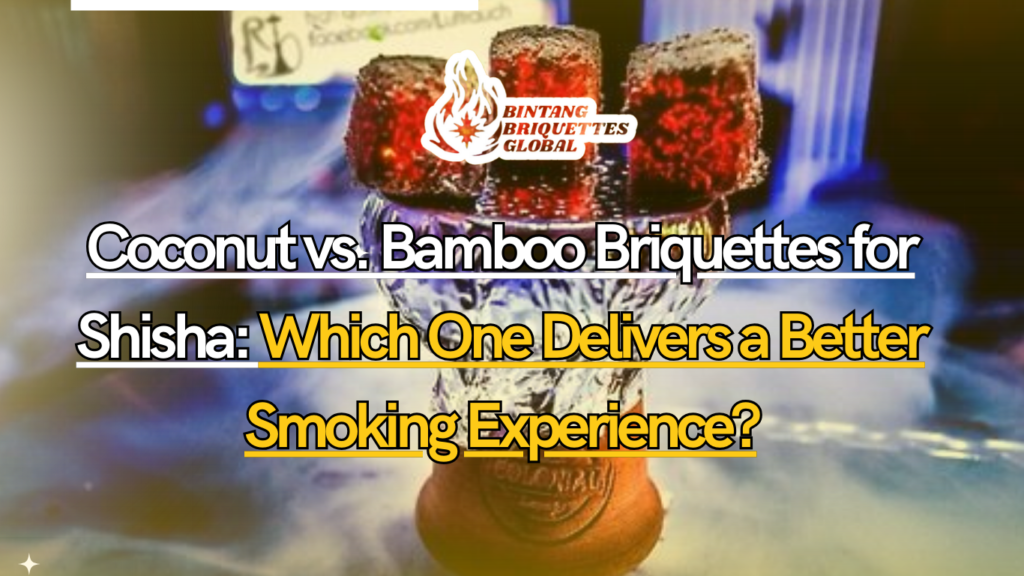Introduction
bintangbriquettes.com – Coconut vs. Bamboo Briquettes for Shisha” is a crucial comparison when aiming to achieve the perfect smoking session, as the choice of charcoal plays a vital role. Two of the most popular options on the market today are coconut charcoal briquettes and bamboo charcoal briquettes.
While both are considered natural alternatives to quick-lighting coal, they offer different benefits in terms of heat, longevity, flavor, and environmental impact. In this comprehensive guide, we’ll explore the differences between these two charcoal types and help you decide which one delivers the better shisha experience.
1. Understanding Shisha Charcoal: Why Material Matters
The material used to produce shisha charcoal greatly influences the smoking session. Good charcoal should provide:
- Consistent heat
- Minimal ash
- No flavor interference
- Long burning time
That’s why more enthusiasts are turning to natural charcoal made from sustainable materials like coconut shells and bamboo.
2. What Are Coconut Charcoal Briquettes?
Coconut charcoal briquettes are made from the shells of coconuts that are carbonized and compressed into uniform shapes. These briquettes are known for:
- Long burn time
- Low ash production
- High heat output
- No added chemicals
Their popularity has soared, especially in regions like the Middle East and Europe, where purity and performance are top priorities.
3. What Are Bamboo Charcoal Briquettes?
Bamboo briquettes are produced from fast-growing bamboo plants. After harvesting, bamboo is carbonized and compressed into briquettes. Their main qualities include:
- Eco-friendliness due to fast regrowth
- Moderate heat output
- Slightly higher ash content
- Slightly easier to ignite than coconut charcoal
4. Raw Material Sourcing: Coconut Shell vs. Bamboo
- Coconut Shell: A byproduct of the coconut industry, using the shells is sustainable and reduces waste.
- Bamboo: Bamboo grows rapidly (some species grow 3 ft/day), making it a renewable resource but requiring dedicated cultivation.
Coconut shell usage aligns with circular economy principles, while bamboo promotes reforestation and carbon sequestration.
5. Burning Properties: Heat, Duration, and Ash
- Coconut Briquettes: Burn hotter and longer; up to 90–120 minutes with very low ash (2–3%).
- Bamboo Briquettes: Burn for 60–90 minutes and produce slightly more ash (5–7%).
For lounge settings or long sessions, coconut briquettes offer superior burn performance.
6. Flavor and Aroma: How Material Affects Taste
- Coconut Charcoal: Neutral taste. Preserves the flavor of shisha molasses perfectly.
- Bamboo Charcoal: May impart a faint woody or earthy note, especially if poorly processed.
For purists and flavor chasers, coconut charcoal is the better option.
7. Health and Purity: Chemical Content and Emissions
Both types can be chemical-free, but quality varies:
- Premium coconut charcoal often passes stringent export tests for emissions.
- Bamboo charcoal can sometimes have residual sap or off-gassing if not fully carbonized.
Always look for third-party lab-tested brands to ensure low CO and no contaminants.
8. Ease of Lighting and Consistency
- Coconut Briquettes: Require 8–12 minutes to fully ignite using a gas or electric stove.
- Bamboo Briquettes: Slightly easier to light; fully ignited in 6–10 minutes.
However, coconut briquettes provide more consistent heat throughout the session.
9. Sustainability and Environmental Impact
- Coconut Charcoal: Upcycled waste product from the coconut industry.
- Bamboo Charcoal: Renewable but requires harvesting and dedicated land.
In terms of carbon footprint, both are eco-friendly—but coconut has an edge due to waste repurposing.
10. Cost Comparison: Coconut vs. Bamboo
- Coconut Briquettes: Slightly more expensive due to higher production and export costs.
- Bamboo Briquettes: More affordable and locally available in some Asian markets.
Price-conscious buyers may lean toward bamboo, but many find the performance of coconut worth the extra cost.
11. User Preferences: Lounge Owners and Home Smokers
- Shisha Lounges: Prefer coconut briquettes for reliability and quality control.
- Home Smokers: May experiment with bamboo due to easier availability and affordability.
Professionals consistently choose coconut charcoal to ensure customer satisfaction.
12. Region-Specific Trends and Preferences
- Middle East: Coconut charcoal dominates due to high standards for taste and cleanliness.
- Asia: Bamboo is common due to local sourcing and cost efficiency.
- Europe & U.S.: Strong preference for coconut briquettes among connoisseurs and premium lounges.
13. Expert Reviews: What the Pros Say
“Coconut charcoal is the gold standard for serious smokers. It’s clean, consistent, and never lets you down.” — Shisha Lounge Owner, Dubai
“Bamboo charcoal is decent for quick sessions, but coconut is what we use for competitions and tastings.” — Hookah Master, Berlin
14. Case Studies: Real-World Testing
In a blind test involving 20 seasoned shisha smokers:
- 17 chose coconut charcoal for flavor retention and heat.
- 3 picked bamboo for ease of lighting and cost.
Conclusion: Coconut wins in quality, while bamboo holds appeal in convenience.
15. Conclusion: Which One Should You Choose?
Choose Coconut Briquettes if:
- You value flavor purity
- You want long sessions
- You’re okay with a higher price
Choose Bamboo Briquettes if:
- You’re a casual smoker
- You prefer faster lighting
- You’re budget-conscious
Final Thoughts
When comparing coconut vs. bamboo briquettes for shisha, it comes down to priorities. For the ultimate smoking experience—long-lasting heat, clean flavor, and minimal ash—coconut charcoal briquettes are the clear winner. But bamboo briquettes still hold value for certain users, especially beginners or casual smokers. In the end, choose the charcoal that best aligns with your smoking style and expectations.


